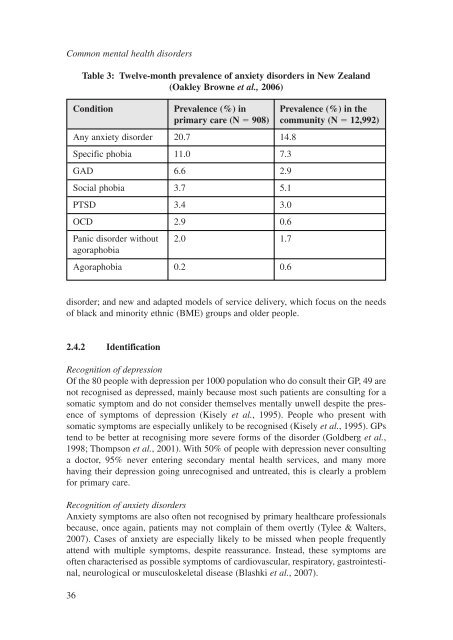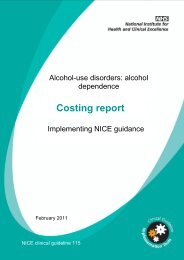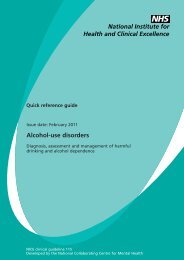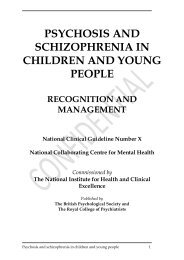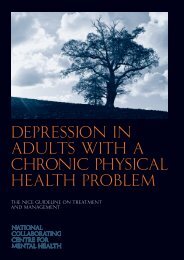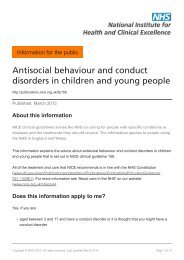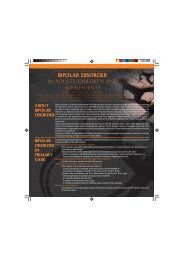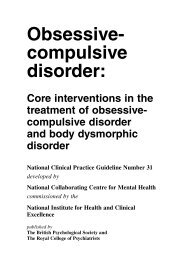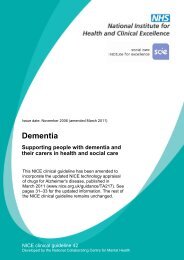- Page 1 and 2: Commonmental healthdisordersTHE NIC
- Page 3 and 4: © The British Psychological Societ
- Page 5 and 6: Contents6 FURTHER ASSESSMENT OF RIS
- Page 7 and 8: Guideline development group members
- Page 9 and 10: Preface1 PREFACEThis guideline has
- Page 11 and 12: Prefacecollaborative manner using t
- Page 13 and 14: PrefaceThe experience of people wit
- Page 15 and 16: Common mental health disorders2.2 T
- Page 17 and 18: Common mental health disordersto ho
- Page 19 and 20: Common mental health disordersManua
- Page 21 and 22: Common mental health disordershighe
- Page 23 and 24: Common mental health disordersNegat
- Page 25 and 26: Common mental health disorderscours
- Page 27 and 28: Common mental health disordersover
- Page 29 and 30: Common mental health disorders2.2.6
- Page 31 and 32: Common mental health disordersTable
- Page 33 and 34: Common mental health disorders1996)
- Page 35: Common mental health disordersSumma
- Page 39 and 40: Common mental health disordersappli
- Page 41 and 42: Common mental health disorderspatie
- Page 43 and 44: Methods used to develop this guidel
- Page 45 and 46: Methods used to develop this guidel
- Page 47 and 48: Methods used to develop this guidel
- Page 49 and 50: Methods used to develop this guidel
- Page 51 and 52: Methods used to develop this guidel
- Page 53 and 54: Methods used to develop this guidel
- Page 55 and 56: Methods used to develop this guidel
- Page 57 and 58: Methods used to develop this guidel
- Page 59 and 60: Access to healthcare4. ACCESS TO HE
- Page 61 and 62: Access to healthcareunder the Menta
- Page 63 and 64: Access to healthcare4.2.3 Studies c
- Page 65 and 66: Access to healthcareIndividual-leve
- Page 67 and 68: Access to healthcareJUNG2003 review
- Page 69 and 70: Access to healthcareSCHEPPERS2006).
- Page 71 and 72: Access to healthcare70Table 8: Clin
- Page 73 and 74: Access to healthcareTable 9: Study
- Page 75 and 76: Access to healthcareCHAPMAN2004 inc
- Page 77 and 78: Access to healthcare4.4 SERVICE DEV
- Page 79 and 80: Access to healthcareBEACH2006 [Beac
- Page 81 and 82: Access to healthcareTable 12: Summa
- Page 83 and 84: Access to healthcareAll studies wer
- Page 85 and 86: Access to healthcarepractitioners h
- Page 87 and 88:
Access to healthcareIndividual-leve
- Page 89 and 90:
Access to healthcarefrom such popul
- Page 91 and 92:
Access to healthcarestructure and d
- Page 93 and 94:
Case identification and formal asse
- Page 95 and 96:
Case identification and formal asse
- Page 97 and 98:
Case identification and formal asse
- Page 99 and 100:
Case identification and formal asse
- Page 101 and 102:
Case identification and formal asse
- Page 103 and 104:
Case identification and formal asse
- Page 105 and 106:
Case identification and formal asse
- Page 107 and 108:
Case identification and formal asse
- Page 109 and 110:
Case identification and formal asse
- Page 111 and 112:
Case identification and formal asse
- Page 113 and 114:
Case identification and formal asse
- Page 115 and 116:
Case identification and formal asse
- Page 117 and 118:
Case identification and formal asse
- Page 119 and 120:
Case identification and formal asse
- Page 121 and 122:
Case identification and formal asse
- Page 123 and 124:
Case identification and formal asse
- Page 125 and 126:
Case identification and formal asse
- Page 127 and 128:
Case identification and formal asse
- Page 129 and 130:
Case identification and formal asse
- Page 131 and 132:
Case identification and formal asse
- Page 133 and 134:
Case identification and formal asse
- Page 135 and 136:
Case identification and formal asse
- Page 137 and 138:
Further assessment of risk and need
- Page 139 and 140:
Further assessment of risk and need
- Page 141 and 142:
Further assessment of risk and need
- Page 143 and 144:
Further assessment of risk and need
- Page 145 and 146:
Further assessment of risk and need
- Page 147 and 148:
Further assessment of risk and need
- Page 149 and 150:
Further assessment of risk and need
- Page 151 and 152:
Further assessment of risk and need
- Page 153 and 154:
Further assessment of risk and need
- Page 155 and 156:
Further assessment of risk and need
- Page 157 and 158:
Further assessment of risk and need
- Page 159 and 160:
Further assessment of risk and need
- Page 161 and 162:
Further assessment of risk and need
- Page 163 and 164:
Further assessment of risk and need
- Page 165 and 166:
Further assessment of risk and need
- Page 167 and 168:
Further assessment of risk and need
- Page 169 and 170:
Further assessment of risk and need
- Page 171 and 172:
Further assessment of risk and need
- Page 173 and 174:
Further assessment of risk and need
- Page 175 and 176:
Further assessment of risk and need
- Page 177 and 178:
Further assessment of risk and need
- Page 179 and 180:
Further assessment of risk and need
- Page 181 and 182:
Further assessment of risk and need
- Page 183 and 184:
Further assessment of risk and need
- Page 185 and 186:
Further assessment of risk and need
- Page 187 and 188:
Further assessment of risk and need
- Page 189 and 190:
Systems for organising and developi
- Page 191 and 192:
Systems for organising and developi
- Page 193 and 194:
Systems for organising and developi
- Page 195 and 196:
Systems for organising and developi
- Page 197 and 198:
Systems for organising and developi
- Page 199 and 200:
Systems for organising and developi
- Page 201 and 202:
Systems for organising and developi
- Page 203 and 204:
Systems for organising and developi
- Page 205 and 206:
Systems for organising and developi
- Page 207 and 208:
Systems for organising and developi
- Page 209 and 210:
Systems for organising and developi
- Page 211 and 212:
Systems for organising and developi
- Page 213 and 214:
Systems for organising and developi
- Page 215 and 216:
Systems for organising and developi
- Page 217 and 218:
Summary of recommendations8.1.1.6 S
- Page 219 and 220:
Summary of recommendationsFigure 12
- Page 221 and 222:
Summary of recommendations●Genera
- Page 223 and 224:
Summary of recommendations8.4 STEPS
- Page 225 and 226:
Summary of recommendations●●a g
- Page 227 and 228:
Summary of recommendationsDiscuss w
- Page 229 and 230:
Summary of recommendationsinclude p
- Page 231 and 232:
Appendices9 APPENDICESAppendix 1: S
- Page 233 and 234:
Appendix 1of a depressive disorder
- Page 235 and 236:
Appendix 1b) Assessment of anxiety
- Page 237 and 238:
Appendix 2APPENDIX 2:DECLARATIONS O
- Page 239 and 240:
Appendix 2Mr Mike BessantEmployment
- Page 241 and 242:
Appendix 2Personal non-pecuniary in
- Page 243 and 244:
Appendix 2Actions takenMr Rupert Su
- Page 245 and 246:
Appendix 2Personal family interestN
- Page 247 and 248:
Appendix 3APPENDIX 3:STAKEHOLDERS A
- Page 249 and 250:
Appendix 4ClinicalpopulationPeople
- Page 251 and 252:
Appendix 4Case identificationNo. Pr
- Page 253 and 254:
Appendix 5APPENDIX 5:REVIEW PROTOCO
- Page 255 and 256:
Appendix 7APPENDIX 7:METHODOLOGY CH
- Page 257 and 258:
Appendix 9APPENDIX 9:METHODOLOGY CH
- Page 259 and 260:
Appendix 92.10 Are all important pa
- Page 261 and 262:
Appendix 9case also excludes costs
- Page 263 and 264:
Appendix 9For consistency, the EQ-5
- Page 265 and 266:
Appendix 9Answer ‘yes’ if the a
- Page 267 and 268:
Appendix 9Answer ‘yes’ if the e
- Page 269 and 270:
Appendix 9Answer ‘yes’ if appro
- Page 271 and 272:
Appendix 10APPENDIX 10: EVIDENCE TA
- Page 273 and 274:
Appendix 11APPENDIX 11:HIGH PRIORIT
- Page 275 and 276:
Appendix 11discussion of options bu
- Page 277 and 278:
Appendix 13APPENDIX 13:GENERALIZED
- Page 279 and 280:
ReferencesAndlin-Sobocki, P., Jöns
- Page 281 and 282:
ReferencesBower, P., Gilbody, S., R
- Page 283 and 284:
ReferencesCooper, S., Smiley, E., M
- Page 285 and 286:
ReferencesEhlers A., Gene-Cos N. &
- Page 287 and 288:
ReferencesGiles, D. E., Jarrett, R.
- Page 289 and 290:
ReferencesHorowitz, M. J., Wilner,
- Page 291 and 292:
ReferencesKnapp, M. & Ilson, S. (20
- Page 293 and 294:
ReferencesMarks, J., Goldberg, D. P
- Page 295 and 296:
ReferencesNCCMH (forthcoming) Self-
- Page 297 and 298:
ReferencesOzer, E. J., Best, S. R.,
- Page 299 and 300:
ReferencesSartorius, N. (2002) Eine
- Page 301 and 302:
ReferencesTiemens, B. G., Ormel, J.
- Page 303 and 304:
ReferencesWilkinson, M. J. B. & Bar
- Page 305 and 306:
Glossarybeliefs and interpretations
- Page 307 and 308:
Glossaryto learn to become more awa
- Page 309 and 310:
Abbreviations12 ABBREVIATIONSADDADS
- Page 311 and 312:
AbbreviationsOASISOCDONSORPHQ (-A,


